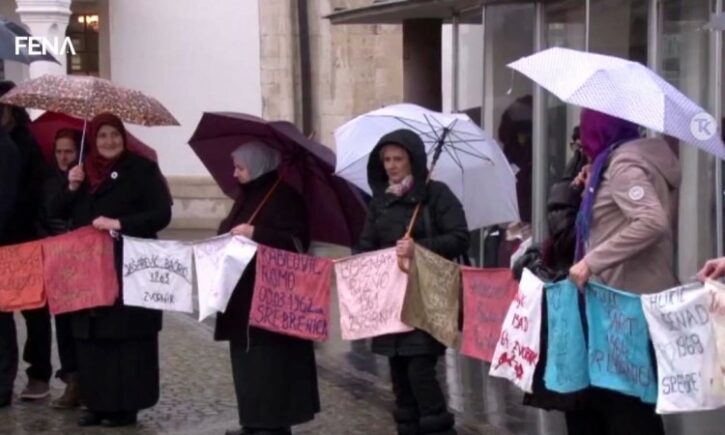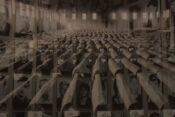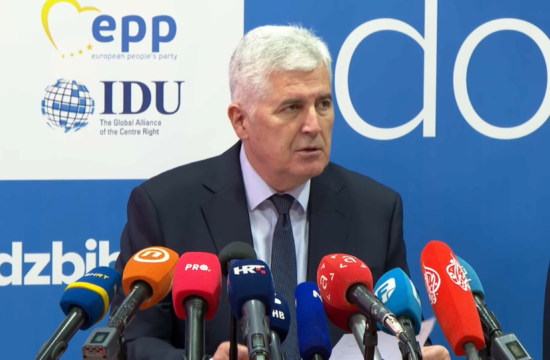
Despite heavy snowfall, members of the ‘Women of Srebrenica’ Association gathered in the northeastern city of Tuzla to protest over a decision by Bosnian Serb authorities to form a commission that would reexamine what happened in Srebrenica during the war.
Authorities in Republika Srpska (RS), one of the two semi-autonomous entities within Bosnia, named last week members of two commissions which would deal with the suffering of Serbs in Sarajevo and all peoples in the eastern town of Srebrenica during the 1992-95 Bosnian war.
But both the International Criminal Tribunal for the Former Yugoslavia (ICTY) and the International Court of Justice have already ruled that Bosnian Serb forces committed genocide in Srebrenica in 1995.
RS authorities, most of all those from the ruling Alliance of Independent Social Democrats (SNSD), however, have for years been rejecting the rulings and denying that a genocide took place.
The establishment of a new commission was condemned by, among others, Bosnia’s top international administrator, the High Representative, tasked with overseeing the civilian implementation of the 1995 Dayton Peace Agreement which ended the war.
It was also met with criticism by both Bosniak officials, and those from non-ethnic oriented parties within the country.
On Monday, the mothers, sisters and other family members of the genocide victims came together as they do every 11th of the month, reminding of the massacre of more than 8,000 Muslim men and boys who were executed on July 11, 1995.
This time they had an additional message: the RS Government is insulting the victims and trying to minimise the responsibility of those who committed the crimes.
The head of the association, Hajra Catic, said that reviewing facts is not problematic in itself, but that the new commission will be reviewing events in Srebrenica since 1992 while the massacre took place in 1995.
The families are still looking for 1,300 victims from the 1995 slaughter and if the investigation starts at 1992, the number will rise to 3,000, she said.
After two international courts have already established what happened in Srebrenica, a new commission is perceived by the families of the victims as an attempt to deny the genocide.
Catic said that nobody from that commission will be allowed to enter the Potocari Memorial Centre, where the remains of victims who were found throughout the years are buried.
Hundreds of women will gather and block the gate, she announced.
Deputy head of the Women of Srebrenica, Nura Begovic, said that Bosnia already has the Institute for Missing Persons which tends to the issue at the state level, as well as all other necessary institutions, courts and laws.
She asked what the point of such a new commission would be.
On July 11, 1995, Bosnian Serb forces overran the eastern Bosnian enclave and rounded up the town’s Muslim Bosniaks, separated men from women and little children and systematically executed some 8,000 men and boys.
The bodies of the victims were buried in a large number of mass graves.
Forensic experts excavate and identify the bones through DNA analysis before returning the bodies to the families who rebury them on July 11 every year at the Potocari Memorial Centre’s cemetery.
International and regional courts have sentenced 45 people for what happened in Srebrenica to a total of more than 700 years behind bars.








